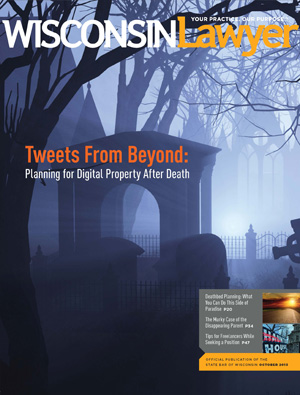 Oct. 7, 2013 – It could be considered eerie to receive a tweet from someone who has died, but that’s the technological age we live in, according to an article in the October Wisconsin Lawyer magazine, available online and in mailboxes soon.
Oct. 7, 2013 – It could be considered eerie to receive a tweet from someone who has died, but that’s the technological age we live in, according to an article in the October Wisconsin Lawyer magazine, available online and in mailboxes soon.
“In this bizarre modern world, you can schedule Facebook, LinkedIn, and tweets to post after you die,” write Deborah Matthews, Sharon Nelson, and John Simek in their cover story, “Tweets from Beyond: Planning for Digital Property After Death.”
One service, the authors explain, guarantees the delivery of messages for the next 100 years and requires users to appoint a trusted executor. Estate planning lawyers will continue to encounter new issues relating to digital assets, they say:
“Most people have no understanding of the digital property they own, and even less understanding of what may happen to those assets if they die or become incapacitated.”
Absent state and federal laws, the online service providers that house digital assets – such as photos, social media posts, videos, or email – determine what happens to those assets through their terms of service, which people normally agree to without reading.
“Loved ones have been forced into courtrooms to get access to digital property,” they write. “Attorneys clearly need to address digital property as they assist with estate planning, intellectual property, and corporate matters."
Other Articles
Estate planning attorneys can help clients and families plan ahead to address digital assets and other property. But what if you get a call from someone needing estate planning help quickly, because the client does not have much time to live?
Meet Our Contributors
Milwaukee Circuit Court Judge Christopher Foley has found his heaven on Earth: It’s called Eagle River. Speaking of Northern Wisconsin, there’s a good chance you’ll see Daniel Finerty up there casting his line for small mouth bass. Diane Diel? You’ll be amazed at how far she will go to educate lawyers. Try 11,000 miles.
Learn more about this month’s contributing authors in our “Meet Our Contributors” column.
In “Deathbed Planning: What You Can Do this Side of Paradise,” attorneys Amalia Levitt Todryk and Kathryn Muldoon offer practical advice on how to deal with such calls.
“Often the first thing you will need to determine is whether your client is legally competent to create an estate plan, update an existing estate plan, or transfer assets, if applicable. In cases in which your client is incompetent, there may be little you can do.”
Attorney Daniel Finerty leads us into the realm of the Affordable Care Act (ACA), advising on how businesses can ward off retaliation claims in, “An Ounce of Prevention: Minimizing Affordable Care Act Retaliation Claims.”
“Because of the breadth of explicitly defined protected activity, employer missteps with regard to ACA implementation can complicate discipline and discharge of employees and may provide fertile ground for retaliation claims,” Finerty writes. The article contains a useful flowchart on ACA retaliation claims and OSHA procedure.
Finally, in “The Murky Case of the Disappearing TPR Parent,” Milwaukee Circuit Court Judge Christopher Foley attempts to clarify “when a parent in an involuntary TPR proceeding is appropriately defaulted for failure to appear or as a sanction for failure to obey a court order to appear in person at hearings on the petition.”
What Else is Inside?
“10 Questions” entitled “Janelle Roethel: In-House Counsel: The Secret to Getting Business Done.” “The corporate setting allows me to provide legal advice that protects the company, while also experiencing first hand the business implications of that advice,” explains Roethel, a 2012 graduate who works for Direct Supply Inc.
A “Final Thought” from Deanne Kroll titled “Ladies, If You Can’t Beat ‘Em, Join ‘Em.” Kroll discusses how women lawyers can combat men-only networking to create and maintain the business relationships necessary to succeed.
